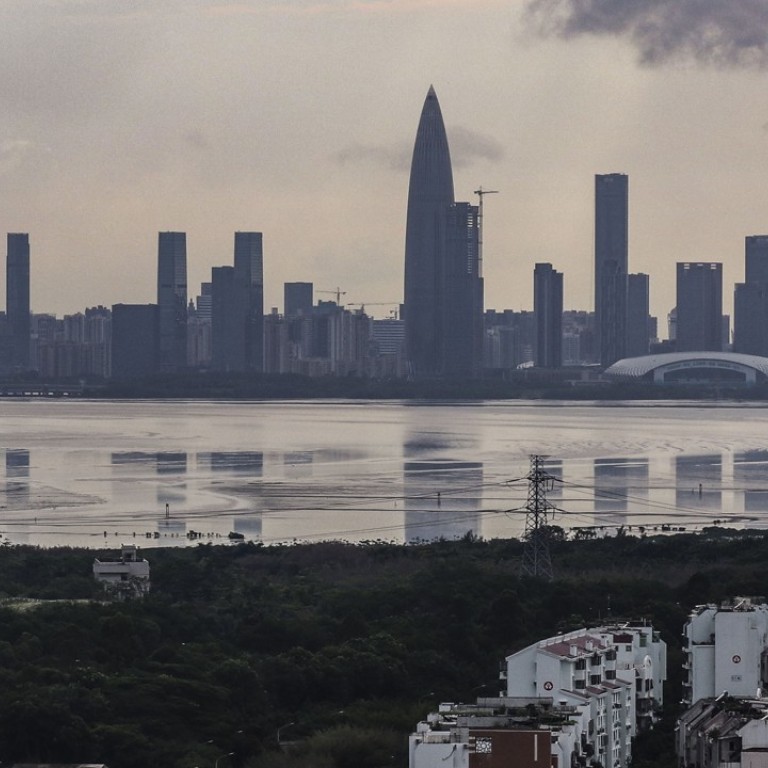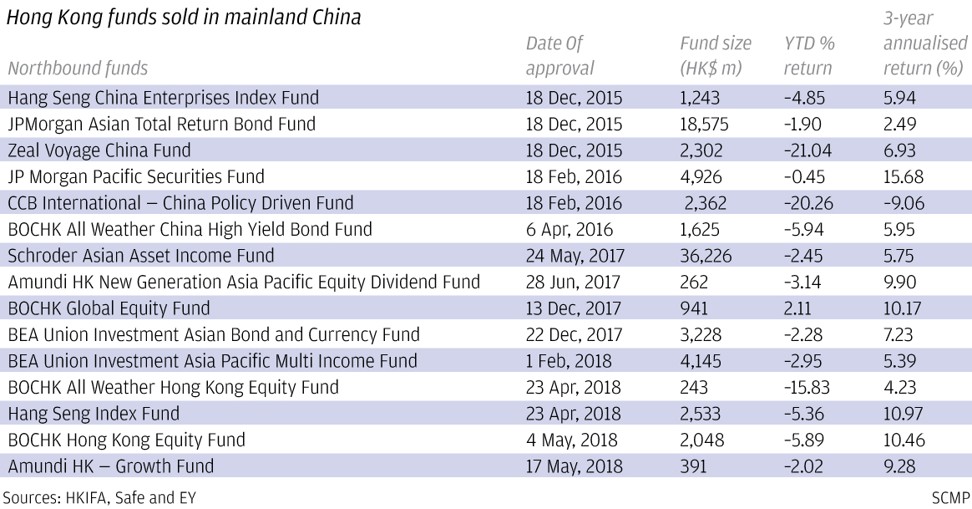
Hong Kong investment funds body seeks China rules relaxation in exchange for limiting sales to ‘Greater Bay Area’
- Greater Bay Area offers huge opportunity for Hong Kong’s fund industry, says EY
- Hong Kong Investment Fund Association wants Chinese regulator to shorten approval process for Mutual Recognition of Fund Scheme
The Hong Kong Investment Fund Association, which represents the Hong Kong businesses of international fund houses managing US$1.2 trillion in assets worldwide, will on Monday urge Beijing to ease restrictions on sale of cross-border funds after a scheme launched in 2015 failed to take off.
The industry body has worked with multinational professional services firm EY on a range of proposals to be submitted on Monday, the top priority being that the China Securities Regulatory Commission lift some restrictions in exchange for Hong Kong funds being sold only in the region covered by the “Greater Bay Area” initiative instead of the whole country. The association also wants the commission to shorten its approval process for the Mutual Recognition of Fund Scheme, the cross-border fund sales scheme launched in 2015, to six months from three years.
Greater Bay Area plan given thumbs up from private businesses, survey finds
“The Hong Kong retail fund market is limited by its small population. The Greater Bay Area has a population of 70 million, which is 10 times that of Hong Kong’s … it offers a huge expansion opportunity for the Hong Kong fund industry,” Christine Lin, partner, financial services at EY, said in an interview.
The association also wants Beijing to allow overseas managers to directly sell their products in the region. Currently, funds managers that want to sell in mainland China need to be based in Hong Kong.
“This has made it hard for global stock funds to apply to be sold in mainland China,” said Nelson Chow, managing director of the Hong Kong client group at AllianceBernstein Hong Kong.
“This is why 10 out of 15 Hong Kong funds sold in mainland China are Asia focused. If Beijing relaxes the rule, more fund houses can apply to bring their global funds to be sold on the mainland, helping mainland investors adopt a more diversified investment approach,” said Chow.
Hong Kong funds being sold in the Greater Bay Area region can currently offer only up to 50 per cent of total assets being managed by the funds to mainland investors, and the association wants this cap to be waived in the interest of more flexibility. It will also urge Beijing to allow trading in exchange-traded funds listed in Hong Kong and Shenzhen by Hong Kong and mainland investors in the region.
The Greater Bay Area has enormous potential to promote the free flow of talent, goods and capital across the region
Another proposal will seek approval for Hong Kong-based fund managers to be able to invest in the Greater Bay Area region for privately run pension schemes.
“The Greater Bay Area has enormous potential to promote the free flow of talent, goods and capital across the region,” said Graham Turl, the association’s chairman. “An urban cluster with a population of 70 million people and an economy of US$1.51 trillion, it presents Hong Kong and mainland asset managers with a significant opportunity.”
The Mutual Recognition of Fund Scheme, launched in 2015 and aimed at allowing Hong Kong funds to be sold in mainland China and Chinese funds to be sold in Hong Kong for a combined quota of 600 billion yuan split equally both ways, has failed to take off.
Three years later, only 15 out of 180 qualifying Hong Kong-based funds have been approved under the scheme for sale on the mainland by the CSRC. Only 10 billion yuan in net flows from mainlanders made it into these 15 funds as of August 2018, according State Administration of Foreign Exchange (Safe), representing only 3 per cent of its 300 billion yuan quota.
Hong Kong’s Securities and Futures Commission has approved 50 mainland funds to be sold in the city under this scheme. However, these have not been very popular, with Hong Kong investors spending only 495.37 million yuan as of the end of August, according to Safe. This represents only 0.2 per cent of its 300 billion yuan quota.
“The CSRC takes 18 months to three years to approve the Hong Kong funds, which is much slower than the six months taken by the SFC for mainland funds,” said EY’s Lin. “There are also a lot of restrictions that have led the cross-border fund sales scheme to fail to take off.”



